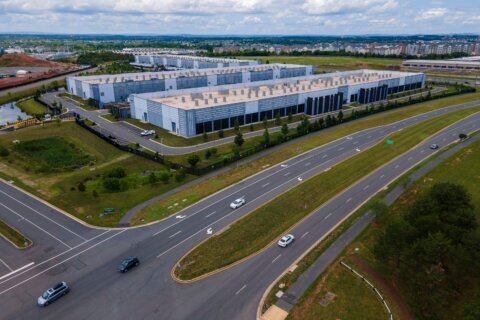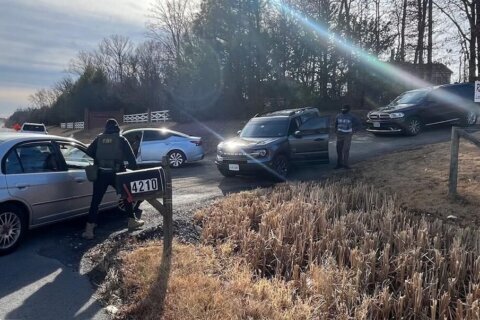This article was republished with permission from WTOP’s news partner InsideNoVa.com. Sign up for InsideNoVa.com’s free email subscription today.
This article was written by WTOP’s news partner InsideNoVa.com and republished with permission. Sign up for InsideNoVa.com’s free email subscription today.
Democratic Rep. Jennifer Wexton and Republican challenger Hung Cao traded barbs once again in a 10th Congressional District debate Wednesday night.
Wexton tried to highlight Cao’s abortion and gun rights views, saying the Republican was “outside of the mainstream” of 10th District voters.
Cao, meanwhile, continued to focus on rising inflation, interest rates and an uncertain economy.
“I called Mr. Cao an extremist because his views are extreme,” Wexton said in her closing remarks at the Manassas Park Community Center, referring to a mailer Wexton’s campaign had sent out and remarks Cao had made at a previous debate on Sunday. “He’s extreme on gun violence prevention. After 19 elementary school children and two teachers were gunned down in Uvalde, he said if there weren’t guns, it’d be knives or hammers or something like that.”
Cao focused on high gas prices and inflation, saying the Biden Administration and Democrats in Congress had caused inflation through environmental protection regulations they’d placed on the oil and gas industry.
“Instead of relying on American workers, who have the cleanest practices in the world, we’re now going to Saudi Arabia, we’re going to Venezuela and even to Iran,” he said. “[Biden] killed the Keystone pipeline XL, he killed a lot of infrastructure and also put a lot of regulations on refineries and the oil industry.”
On abortion, Wexton didn’t get into specifics on what she would want federal legislation enshrining abortion rights into law would look like, but she said decisions over reproductive rights should be left to women and their doctors. Cao told the crowd that he was “absolutely pro-life” and that he didn’t want to see Congress getting involved. Instead, he said, the laws around abortion should be left to state legislators.
He also accused Wexton of wanting “abortion up to the moment of birth” and said a law existed allowing such a procedure, while no such law exists.
On local issues like the PW Digital Gateway proposal that would increase the amount of land available for data center usage in the county, both candidates rehashed talking points from an earlier debate, with Cao saying he was concerned about potential impacts on the Occoquan River watershed and Wexton saying that while the proposal would be up to local leaders and not members of Congress, she wanted any significant land-use changes to be done carefully and without impacts to the Manassas National Battlefield Park.
Moderator Stephen Farnsworth, a professor of political science at Mary Washington University, also asked the candidates about possibly expanding Metro into Prince William County. In 2021, the Virginia Department of Rail and Public Transportation completed a preliminary study on possibly expanding Metrorail, bus rapid transit or express bus service into the county, but any potential implementation of those options remain years, or even decades, away.
Cao said he would support the expansion of Metro, in particular given the upcoming change I-66 from HOV-2 to HOV-3, but he said he wouldn’t want it to become a “debacle,” as he put it, like the Silver Line expansion to Dulles Airport, which is years behind schedule and over budget.
And on the Virginia Department of Education’s recent policy changes regarding treatment of transgender students in public schools, the candidates were even more pointed than their last debate.
Cao said simply that “biological boys shouldn’t be in girls’ bathrooms, locker rooms or sports.”
Wexton said the new policies “vilify” kids who already suffer from higher rates of suicidal ideation and depression.
“Of course parents should be involved in their kids’ lives when it comes to schools,” Wexton said. “Things like this are not helping, I talk to providers in the area who say that they’re getting frantic calls from kids. That shouldn’t be happening.”
So far, Wexton’s campaign has far outraised and outspent Cao’s in her bid for a third term. But the Cao campaign announced earlier this week that in the third quarter, it had raised over $1 million, more than double his previous total fundraising haul. The Cao campaign also released its first official 30-second ad, highlighting his story of fleeing Vietnam with his family at the age of 4 and going on to reach the rank of captain in the U.S. Navy.
Most election handicappers have the district – which includes parts of Prince William, Fauquier, Fauquier, Loudoun and Fairfax counties – as a likely Democratic seat. Its precincts favored Democratic gubernatorial candidate Terry McAuliffe by a slight margin over Republican Gov. Glenn Youngkin last year, but election analysis site FiveThirtyEight shows it having an 8-point Democratic lean.
There were some points of agreement on Wednesday night, though they were few and far between. With Youngkin pushing a plan to continue relying on natural gas until Virginia can become “the world’s leading nuclear energy hub,” both candidates said they wanted to see more nuclear energy produced in the commonwealth. Dominion Energy currently operates two nuclear power plants in Virginia, one in North Anna and the other in Surry.
Cao said that the Navy’s been using nuclear safely for 75 years and that the U.S. should “absolutely” expand its use.
“Nuclear energy is very safe, very clean, and the most efficient thing out there,” he said, with Wexton agreeing that more nuclear energy should be produced.
Both candidates also called for better border security, though Cao said he wanted to see “taller walls and wider gates” on the U.S.-Mexico border. Wexton said that the country should use more advanced technology to secure the border while making it easier for “dreamers” – people who were brought to the U.S. as children and have been here for more than a decade – and temporary protected status holders to attain legal status.
On election security and foreign policy, though, the differences remained stark. Wexton pointed out that Republican legislators in many states have moved to appoint partisans who’ve supported the lie that Donald Trump won the 2020 election to oversee elections, while Democrats have pushed to expand voting access through early voting, same day registration and mail-in ballots.
Cao called fears about Republican-backed voting restrictions “insulting” to minorities and said that in Iraq and Afghanistan, elections were made secure because ink was used to mark ballots and those who’d already voted. “Voting is up to the states and the states will manage it,” Cao said.
When asked about Russia’s invasion of Ukraine, Wexton said it was important to continue to support the Ukrainians and that doing so is “about democracy all over the world.”
Cao, on the other hand, said the U.S. was spending too much on propping up the Ukrainian government.
“I don’t know why we’re worried so much about a border … between Russia and Ukraine, and we’re not worried about our own border,” he said.







